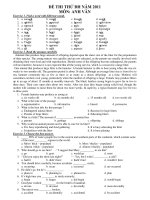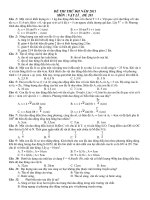ĐỀ THI THỬ ĐH NĂM 2011 MÔN: ANH VĂN pdf
Bạn đang xem bản rút gọn của tài liệu. Xem và tải ngay bản đầy đủ của tài liệu tại đây (51.24 KB, 3 trang )
ĐỀ THI THỬ ĐH NĂM 2011
MÔN: ANH VĂN
Exercise 1. Find a word with different sound.
1. a. enough b. cough c. though d. rough
2. a. rubbish b. punctual c. funeral d. cultivation
3. a. stomach b. among c. topic d. budget
4. a. absent b. government c. comment d. dependent
5. a. now b. bowl c. down d. cow
6. a. assist b. must c. island d. mist
7. a. leisure b. measure c. laser d. usually
8. a. Twain b. mountain c. bargain d. fountain
9. a. luxury b. summer c. slum d. rumour
10. a. till b. mild c. primary d. Iowa
Exercise 2. Read the passage carefully.
Animals that produce large amount of offspring depend upon the sheer size of the litter for the perpetuation
of their species. The young mature very quickly and are not educated, as the parents are usually involved with
obtaining their own food and with reproduction. Should some of the offspring become endangered, the parents
will not interfere, because it is not expected that all the young survive, which is a reason for a large litter.
One animal that produces large litter is the hamster. A female hamster is able to bear young when she was six
weeks to two months old. The gestation period is about 16 days. Although an average litter size is from five to
ten, hamster commonly has as few as three or as many as a dozen offsprings at a time. Mothers will
sometimes eat their own young, particularly when the number of offspring is large. Female may produce litters
up to an age of about 15 months at monthly intervals. The blind, hairless young begin to grow fur in two to
three days. Their eyes open after about two weeks. After ten days they began eating solid food, though the
mother will continue to nurse them for about two more weeks. In captivity, a typical hamster may live for two
to three years
1. Female hamster may produce as young as
a. six weeks old b. six months old c. 15 months old d. two weeks old
2. What is the tone of the passage
a. argumentative b. informative c. biased d. persuasive
3. What is the best title for this passage ?
a. Endangered animal litters b. Reasons for large litters
c. Parents of large litters d. Educating litters
4. What is a little? The amount of ____________ an animal has
a. parents b. garbage c. offspring d. siblings
5. Why would an animal parents not be able to care for its litter?
a. It is busy reproducing and food gathering b. It is busy educating the litter
c. It interferes with the litter d. It is busy playing
Exercise 3. Choose the best answer.
1. _____ 90% of Asia’s people live in the eastern and southern parts of the continent, which contain some
of the most _________ regions in the world.
a. Most / thick – populated b. Most / thickly – populated
c. Almost / thick – populated d. Almost / thickly – populated
2. Who should go to see him? - “ I suggest that Mary __________ to see him”
a. go b. goes c. would go d. went
3. “ Did you enjoy the show last night?” “ – Yes, but I wish I __________ a cold”.
a. hadn’t b. didn’t have c. hadn’t had d. wouldn’t have
4. You should drive carefully, because accidents __________ easily.
a. occurring b. occur c. occurred d. are occurred
5. He didn’t go, but he’s ____________.
a. plans to b. planning to c. planned to d. plan
6. It’s high time you _________ to study seriously.
a. begin b. began c. did begin d. would begin
7. Goodyear worked __________ for the benifit of mankind.
a. devote b. devoted c. devotedly d. more devotedly
8. The mirror was _________ broken.
a. accident b. accidentally c. accidental d. by accident
9. Examinations make me ___________ . I always get ___________.
a. angry being nervous b. anger nervously c. angrily nervous d. angry nervous
10. I’m going to the market, but I can’t think of __________ to buy dinner.
a. where b. what c. that d. which
Exercise 4. Give the correct form of word in bracket.
Until World War II there was very distinct ( 1 – society ) _____ groups in British society. There was an
upper class that included aristocracy and many people who lived on inherited wealth , a middle class that could
be ( 2 – divide ) _____ into upper middle class, middle class and ( 3 – low ) _____ middle class, and a working
class that included both skilled craftsmen and unskilled ( 4 – industry ) ______ workers and ( 5 – agriculture )
____ ( 6 – labour ) _______. The ( 7 – divide ) _______ between the classes were reflected in many aspects of
life. Working – class children usually left school and went out to work at the age of 14. Upper – class children
were educated in private schools and formed the ( 8 – major ) _____ of students at university. Pubs were
divided into public bars ans saloon bars which were more ( 9 – expense ) _____ and more comfortable. Trains
had first, second and third class ( 10 – carry ) _____. Theatres had a dress circle where theatre – goers wore
evening dress, and a gallery where the seats were cheaper and evening dress was not worn.
Exercise 5. Fil in the blank with suitable word
Long (1) _______ a lot of people thought the moon was a god. Other people thought it was just a light in the
sky. And others thought it was a big ball of cheese.
Then telescopes were made. And men saw that the moon was really another world. They wondered (2) _____
it was like. They dreamed of going there.
On July 20, 1969, that dream (3) _____ true. Two American men landed on the moon. Their names were
Neil Amstrong and Edwin Aldrin. The first thing the men found was that the moon is (4) _____ with dust. The
dust is so thick that the men left footprints where they walked. Those were the fisrt marks a living thing had
ever made on the moon. And they could stay there for years and years. There is no wind or rain to wipe (5) ___
off.
The two men walked on the moon for hours. They picked up rocks to bring (6) _____ to earth for study.
They dug up dirt to bring back. They set up machines to (7) ________ out things people wanted to know. Then
they climbed back into their moon landing craft.
Next day the landing craft roared as the two men took off from the moon. They joined Micheal Collins in the
spaceship (8) _____ waited for them above the moon. Then they were off on their long trip back to earth.
Behind them they left the plains and tall mountains of the moon. They left the machines they (9) ____ set up.
And they left footprints that may (10) ________ forever.
Exercise 6. Rewrite the sentences without changing their meanings.
1. Success in the academic field depends on your ability to amass qualifications.
The more ______________________________________________________
2. Absolute secrecy was crucial to the success of the mission.
Without _______________________________________________________
3. The supermarket closed before David arrived in the car.
By the time ____________________________________________________
4. Sally is very disorganized so she has no chance of getting that secretarial job.
Were it ________________________________________________________
5. I’m not to be disturbed under any circumstances.
Under _________________________________________________________
6. It’s a long time since I read such a good article.
I ______________________________________________________________
7. Everyone said that the accident had been Carol’s fault.
Carol was _______________________________________________________
8. I’d rather you didn’t go.
I’d prefer ______________________________
9. They’ll arrive soon.
It won’t ________________________________
10. Let’s go home at the end of the second act.
As soon as _______________________________________________________
Exercise 7. Match a sentence (1 – 10 ) with a response ( a – l ). Not all the responses are used.
1. Mmm! This is delicious. A. Isn’t your drink is very nice ?
2. Regular fries and a chocolate milkshake, please. B. Normal or large prints ?
3. Ouch! I’ve cut myself! C. Let me have a look. I’ll try and fix it.
4. Could I have some more cakes? D. I’ll get you a cloth
5. Yuk! How disgusting! E. Have you? You poor thing. I’ll get you sth for it
6. Things aren’t what they used to be. F. Here or away?
7. Whoops ! I’ve spilt my coffee! G. You’re right there! It was different in our days.
8. I was furious when he said it was my fault. H. I’m glad you like it.
9. I’ve got an awful headache I. Of course. Help yourself.
10. Could you develop this for me ? J. I bet you were! Why did he blame you?









